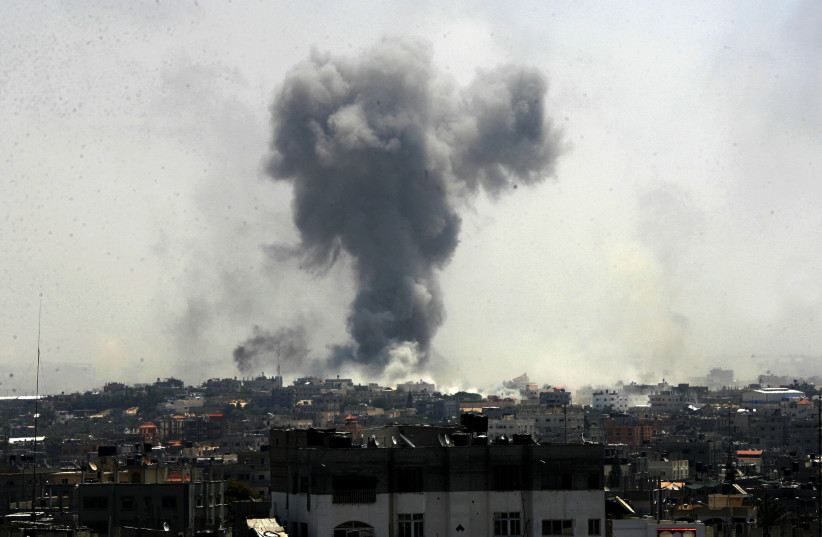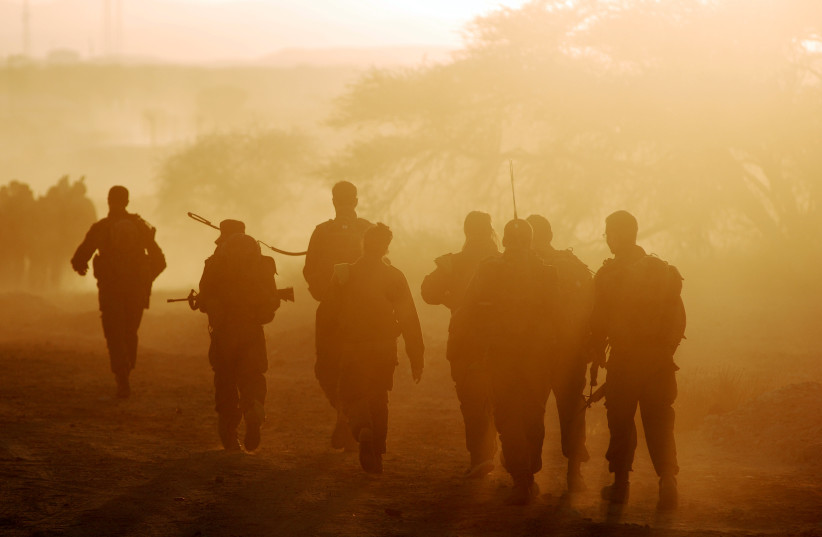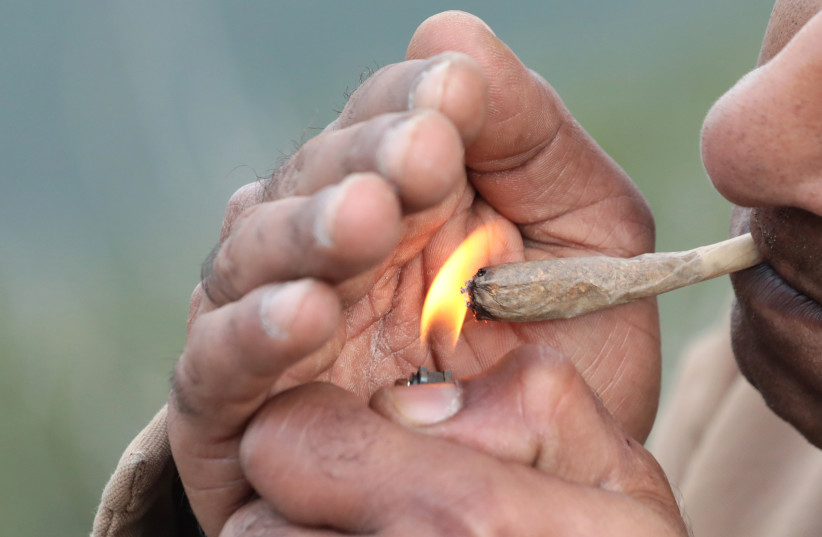Wars never truly end for a soldier.
Long after the sirens’ wailing is silenced, the ceasefire quiets artillery pieces and the news cycle moves on, many soldiers continue to fight private battles, suffering from post-traumatic stress disorder (PTSD) and other mental health issues. These battles are often fought alone.
Remembrance Day for the Fallen of Israel’s Wars and Victims of Acts of Terrorism is a period of remembrance, but soldiers continuing to grapple with mental health issues often feel forgotten. Last Remembrance Day, the mental health of IDF soldiers was thrust to the forefront of public and political discourse when a disabled veteran set himself on fire in front of Defense Ministry offices in protest of the difficulties he endured when seeking aid.
Yet even with growing awareness of the hidden epidemic plaguing Israel’s warriors, many soldiers feel they are unable to ask for help, due to societal pressure, systemic challenges and personal stigmas.
Now, veterans are answering the call to arms to help their brothers-in-arms. A nonprofit is telling soldiers that they no longer need to fight alone – and that even heroes need help.

Guardian Brother
Yaakov Smith served in the Givati infantry brigade’s special recon unit from 2007 until 2014, achieving the rank of captain, presiding over a company. He was discharged, and had just started his studies when rockets began to rain down over Israel. Operation Protective Edge was launched to stop the Gazan bombardment and destroy Hamas tunnels leading into Israel. Smith returned to the army as a reserve officer in charge of medical evacuation.
“We managed to succeed in all of our missions, except one: There was a tunnel that crossed into Israel that we needed to find,” Smith recalled. “And that’s why at the end of the war, we got the mission again to find the tunnel and destroy it. Unfortunately, when we got over there, they were waiting for us.”
On August 1, 2014, “Black Friday,” three soldiers, including officer Hadar Goldin, were killed. IDF forces began to withdraw forces soon after, having felt it had achieved its objectives.
“I just went back home to a regular life,” said Smith. “That’s where the war ended for me. But it didn’t exactly end.
“You can’t go from one extreme to a day-to-day life, just studying, working,” Smith continued. “It started to affect me to a point where a friend of mine gave me a phone number... of a therapist, and he said, ‘Go to him. You got 12 meetings with him for free. Just do what you need to do.’ At the time, I don’t think I would have even considered asking or getting therapy.”
Smith thought that as a combat soldier he would be fine. He had told his soldiers that warriors don’t discuss pain – being a soldier was about sacrifice and duty.
“Those 12 meetings changed my life,” said Smith. “They gave me a new perspective on myself and on how to take my army experience and utilize it.”
Four years later, Smith began receiving many affidavits from the Defense Ministry. His soldiers were seeking to get aid from the army, and to qualify, their stories needed to be confirmed by their commander. Smith was frustrated – according to him, getting mental health aid should be as easy and as natural as eating or sleeping.
Smith launched the nonprofit Guardian Brother to help IDF soldiers get the help they need as fast as possible, anonymously, without bureaucracy, and on their terms. Guardian Brother offers veterans what changed Smith’s life: 12 free therapy sessions.
The name of the nonprofit is derived from the Bible, when God asked Cain about his murdered brother Abel’s whereabouts. Cain responded flippantly to God, “am I my brother’s keeper?”
“The nonprofit says, ‘yes, you’re the guardian of your brother. You are responsible,’” said Smith.

Invisible wounds
The Magazine spoke to an elite commando unit veteran who had fought in Protective Edge about his experience with trauma.
“The vast majority of people who enter these combat situations don’t leave them behind,” said the soldier. There’s a very small percentage of the population that does not suffer from any form of combat fatigue.
“I don’t think the causes are actually properly acknowledged, but a lot of people talk with ideas like PTSD being caused by [fear-based] trauma,” the soldier continued. “And I highly disagree with that. I think there are very few people who actually experience [fear-based] trauma and I think a lot has to do with the shame of not being able to save your comrades in that situation, from injury or death.”
The soldier also noted that an often unexplored issue is that soldiers go through conditioning to fight, and even kill, and then come back into normal society where that conditioning isn’t relevant anymore. This creates stress, frustration – and even shame – over not meeting one’s purpose.
Smith also notes that there are perspectives and tools on “how things should be done in the battlefield, which may be holding them back in civilian life.”
“They [combat veterans] are the best of Israel, not pitiful people – but they need help,” said Sasson Rahabi, a social worker and therapist with Guardian Brother.
Rahabi also works on a program called Peace of Mind – which works in partnership with Guardian Brother – that brings soldiers to stay with families in the UK, Canada and the US and gives them the opportunity to talk about their problems outside of their usual environment. They tour around the cities they visit, on their journey to heal. Unfortunately, the pandemic suspended the program.
At 64, Rahabi still does reserve duty. He was a company commander in Nahal’s 931 Battalion during the First Lebanon War. In one incident, IAF F-4 Phantom warplanes bombed the Nahal Brigade. Dozens were killed in Rahabi’s battalion. Two others were killed during operations.
“But they continued, with their work, and then after with life,” said Rahabi. He warned that there were many soldiers who are walking the streets and never received proper attention.
While the scars of trauma are not immediately obvious, there are outward symptoms, Rahabi explained.
Those with PTSD often have short patience, and may get irritable easily. They often have problems with family, difficulty connecting with parents and lack of patience with children. Romantic relationships also suffer, which they may be fearful of.
“Many are embarrassed to say that they are having issues,” said Rahabi, and use marijuana and other drugs to self-medicate and alleviate symptoms.
The anonymous soldier shared what his experience was like with PTSD, and how he had seen other soldiers deal with trauma. According to him a major issue is “your emotional regulation, your ability to not be affected.”
“I’ll be walking down the street or something, in one moment, I’ll make eye contact with someone, some guy like me or something, and I feel like I want to snap his head off,” he related. “And then the next moment, I see a sparrow with a broken leg and it makes me want to cry.”
It’s a difficult “balance of feelings, like intense aggression and compassion at the same time,” he continued. “So you have to deal with that regulation. You have to learn how to deal with that. Otherwise you become an insane person and nobody would want to interact with you…. You have hypersensitivity and hyperactivity, so you have to learn how to regulate that. And it’s very taxing. So there are people who can’t regulate it” and they become the stereotypical cases.
Many also suffer from sleep disorders, and at times may have severe nightmares.
“You’re always paying attention around you, watching out for stuff,” the soldier continued. “And there’s things that might set you off” and remind you of past trauma. Because of the PTSD-induced hyperawareness, a veteran might have “difficulty being in crowded places because can’t pay attention to everything going on.”
Rahabi thinks people should reconsider the stereotypes of combat trauma only manifesting as shaking and shouting at night.
“These are brave heroes, they buck the stereotypes,” he said. Part of the reason they’re ignored is because if the soldiers aren’t acting stereotypically, they’re assumed not to be suffering.
“There are men out there who are walking around wounded for life. You can’t see it,” said the anonymous soldier.
Smith estimates that there are as many as 1,500 soldiers that need help with trauma each year – though it is difficult to know given how many avoid seeking help.

Fighting the trauma alone
Soldiers avoid seeking help in their private war of attrition for a complex series of reasons.
Many are afraid of the repercussions of seeking help through normal official channels, which may require registering and being in the system. As someone recognized as having mental health issues, they fear future difficulty seeking security positions, work in the Defense Ministry, increased health insurance premiums – and a release from reserve duty.
“One of the major issues of guys asking for help in the mental health area is that they want to continue doing reserve duty with their friends,” said Smith. “Because it’s more important for them than anything.”
Others just don’t want to go through the bureaucratic trouble, and then have nothing come out of it, Smith explained.
Some minority groups have distinct societal pressures for not seeking help.
“Female veterans do not want to be categorized in any way as not suitable for combat units and they believe that if they seek mental health that would just play a role in those who oppose female combat soldiers,” said Smith.
Foreign-born “lone soldiers,” those who do not have immediate family in Israel, feel that they face similar scrutiny.
They’re “trying to live up to certain expectations they believe of the Israeli society, preventing them from seeking mental health because they do not want to be presented as not Israeli enough,” Smith explained.
This is especially important, as foreign-born lone soldiers are particularly in need of help – Smith estimates that 60% of those that Guardian Brother has helped were lone soldiers.
“I think that isolation breeds mental illness,” said the anonymous soldier, himself a former lone soldier. He also noted that lack of a community and not being able to communicate in an appropriate manner due to a language barrier” are factors in why so many still need help.
The warrior ethos of soldiers, which some might describe as machismo, is likely the major factor for why many don’t seek help.
“I don’t care what other people think,” said the anonymous soldier. He doesn’t want to see himself as needing therapy, “I want to do everything myself.” He said that there is “a desire for self-reliance, to be tough.”
Seeking therapy is seen by some as a weakness, explained Galia Geffen-Offer, a social worker who does much of the administrative operations for Guardian Brother.
“People think time will help, but it often doesn’t improve over time,” Geffen-Offer warned.
<br>Accepting the need for therapy
Geffen-Offer joined Givati’s reconnaissance battalion as a training officer on Black Friday, during Protective Edge.
“People just returned from combat, from Gaza,” said Geffen-Offer. “I don’t know if it’s possible to explain to someone who hasn’t seen it, but when you look the soldier in their eyes, their gaze is different, something in their eyes is different.”
“I have friends and people I grew up with that came out of Protective Edge different,” Geffen-Offer continued.
Later, as she served as an operations officer in reserve duty, she watched as the hardships continued for the same Givati soldiers.
“PTSD is like an invisible injury – a soldier that is in combat and loses an arm, you see that he’s disabled, but a soldier that is in combat and has PTSD, you don’t see it,” said Geffen-Offer.
“I remember all the conversations about soldiers that won’t get help, how to get him to seek help,” she continued.
“You can’t convince someone to get the help without them wanting or understanding they need it,” said Smith. The soldier “needs as many barriers to be taken away for him to feel comfortable, to start a very personal, intimate – painful, a lot of the time – journey.”
“There are many that need help. This program gives them the first embrace,” said Rahabi.
Guardian Brother’s objective is to start soldiers – preferably combat soldiers above age 25 – on their journey by making the process as easy as possible, and to remove stigmas about seeking help.
“There is no shame and there’s no stigma, it doesn’t mean they are weak, it doesn’t mean they’re victims,” Smith assured. “Don’t expect to cure anything in 12 sessions – but the idea is to open them up to the idea of getting help – that it is legitimate.”
People are hesitant to pay for therapy, because they don’t see the immediate results. Smith challenges how one can put a price on something as valuable as a stable marriage, a good relationship with one’s children, even on happiness itself.
“Maybe you don’t see an immediate difference,” said Smith. “But eventually a wife has got a husband, a child has got a father, an employer has got an employee.”
<br>How can soldiers get help?
Getting help for soldiers is now a text message away, and is completely anonymous. All one needs to do is message a dedicated number “I need help.”
“There’s no need for them to send any information about who they are,” said Smith. “They get back a message that congratulates them on the first step and gives them the number of our head therapist,” Sasson Rahabi. Internally, the soldier seeking help is only known by a number to ensure anonymity.
There’s no bureaucracy where they need to sign forms and go to multiple meetings beforehand. The first session is to understand the needs of the soldier, and find what their needs are, Geffen-Offer explained.
Ninety percent of Guardian Brother’s volunteers are former combat soldiers, many commanders and officers, and many have gone through trauma themselves. This allows them to speak to soldiers on their level.
Rahabi “evaluates the situation and then he refers the guy or girl to a social worker or therapist for his expertise in the field of PTSD,” said Smith.
“We offer them the option to see an expert on it, and then we help them pursue that option,” said Rahabi.
At the end of the 12 sessions, Smith gets a summary, which explores the problems, the recommendations and the next steps the soldier would be taking.
“They can go through the Defense Ministry to start claiming help through them. They can go through different nonprofits,” said Smith. Rahabi said that they stay with them through the process.
The Magazine gave the anonymous soldier the number for Guardian Brother. While he only had his first session, he said it “seemed very beneficial. More people should know about this.”
“When a soldier says ‘thank you, you helped me’ we don’t need anything more than this,” said Geffen-Offer. She implored others to seek them out, promising “you’ll get the help you’ll need.”
<br>The wars-after-war
Rahabi has expressed frustration with his past experience trying to appeal to the state, Knesset and Defense Ministry to get the help soldiers need. The Defense Ministry said if they were high-functioning trauma sufferers, it was the IDF’s responsibility, and the IDF would in turn refer them to the ministry.
“The nation expects young men to go and be ready to give up their lives, and we all do that knowingly,” said the anonymous soldier, who said that he doesn’t expect special treatment for soldiers, just that the state holds up its end of the bargain.
Following the April 12 self-immolation of Itzik Saidan, Defense Minister Benny Gantz launched the One Soul reforms. Bills and amendments have been signed to increase eligibility for compensation, a 24/7 hotline has been established for those suffering PTSD and crisis houses have been developed for those suffering severe mental breakdowns, as well as other administrative reforms.
Smith doesn’t hold anything against the ministry. “We’re not coming over here to fill or to take the place of the Defense Ministry, the army, or the responsibility of other nonprofits,” said Smith. “We are here to get to a segment of people that the big system rightfully cannot get to.”
“I hope to stabilize the nonprofit in such a way that we would be funded and recognized by the government, by the Defense Ministry, at some point as the first aid for the veterans who need help,” he continued.
Smith is in the battalion commander’s course, and will continue to lead soldiers in reserve duty. But for him, the Guardian Brother team and their sense of responsibility to their soldiers doesn’t end when they leave the battlefield.
The defense establishment is often preoccupied with fighting the war-between-wars, but perhaps it is the private wars-after-war at home that needs reinforcement – and nonprofits like Guardian Brother may be the vanguard.
Guardian Brother can be messaged by IDF veterans seeking therapy at 050-656-3748 or learn more at www.guardianbrother.org.
Donors can contribute to Guardian Brother by clicking here.
The Defense Ministry PTSD hotline can be reached by dialing *8944.
